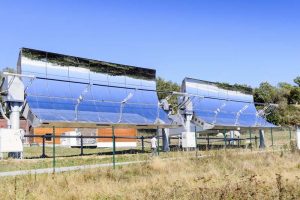CNRS – PROMES – MicroSol’R
TA63 – CNRS-PROMES-MicroSolR
Location
Av. Professeur Félix Trombe
66120 Font-Romeu-Odeillo-Via, France

Description
Organisation Description:
PROMES is a research unit of the National Centre for Scientific Research (CNRS) and is linked to the University of Perpignan (UPVD). The laboratory is located in three sites, namely Odeillo-Font Romeu (CNRS Solar furnaces), nearby Targasonne (central receiver solar facility in Thémis site), and Perpignan (Tecnosud business zone and University proximity). The staff of PROMES is comprised of about 150 employees, working in three research groups and six technical/administrative departments. The three research groups are ‘materials under extreme conditions’, ‘next generation CSP’, and ‘storage and solar chemistry’. PROMES is leading or is involved in several European and national projects. It is notably currently leading the national project ‘laboratory of excellence’ SOLSTICE (Solar Energy: Science, Technology and Innovation for Energy Conversion) to improve solar research.
In addition to the topics to which PROMES contributes directly, external users come for many additional fields and applications, such as biomaterials for health, solar laser for industrial or energy applications, or rare earth materials properties investigation. The wide versatility of usage of PROMES-CNRS solar facilities is due to the wide power range available (from lab scale to industrial prototypes) and power density (conveniently controllable up to 16000 suns, achieving up to 4000°C for material tests, or 3000+ °C for processes).
During the previous SFERA-III program (H2020, 2019-2023), unachieved as of writing, nearly 80 different users, mostly European, used our solar facilities through the trans-national access for nearly 40 projects and 80 weeks. The SFERA-II program, with a larger budget (FP7, 2014-2017), allowed 94 users from 49 projects to benefit from the PROMES-CNRS solar facilities, similar to SFERA-I (FP7, 2010-2014) or Solface (FP5, 2004-2007), covering 15 to 20% of the total operation time of the facilities.
A very large spectrum of research areas is supported, either at high temperatures (from ambient up to 4000°C) and/or high flux (up to 16 MW/m2) and from fundamental research to industrial developments (Technology Readiness Level (TRL) 3 to 7). The research areas include so far electricity production, energy storage (thermal latent or sensible, chemical such as metallic foams for hydrogen,…), thermochemistry (solar fuels, synthetic fuels, hydrogen,…), physics (heat exchanger characterisation, spectrum manipulation,…), solar metallurgy and high temperature materials synthesis or characterisation (aerospace, automotive, solar receivers, nuclear reactors,…), photophysics (high concentration PV, thermoionic conversion,…), biology (bioreactors, water treatment,…), industrial heat and processes hybridisation and space processes (components for probes including for NASA and ESA, moon/mars colonies…).
Research Infrastructure Description
The pilot trough parabolic plant (MicroSol'R) has 2 orientations of the collectors (E-W and N-S) for testing collector tubes with environment-friendly thermal oil and complete thermal loops. It is equipped with two kinds of thermal storage systems, including a thermocline with easily exchangeable filler materials, a loop for steam generation, and an ORC turbine to produce electricity. This research infrastructure has high flexibility of its 3 heat loops with extensive instrumentation (temperature, flow, pressure), allowing, for instance, the testing of new materials for solar absorption, testing of materials for thermal energy storage, or testing of thermodynamic converters, and assessing their efficiency.
Testing Capabilities
The MicroSol'R pilot plant supports testing of collector tubes, thermal storage systems, and thermodynamic converters, featuring flexible heat loops and extensive instrumentation for solar absorption materials, thermal energy storage, and efficiency assessments.
Technical Equipment
The MicroSol'R plant features collectors with E-W and N-S orientations, thermal oil, thermal storage systems, and an ORC turbine. It supports testing of solar absorption materials, energy storage, and thermodynamic converters.
Additional information
Technology Readiness Level: 4-6
Special considerations: N/A
Technology clusters: CSP/STE, Energy Storage, Materials for Energy
Website: http://www.promes.cnrs.fr
Availability: All year
Provision of tools to prepare data sets in a FAIR way: Yes
